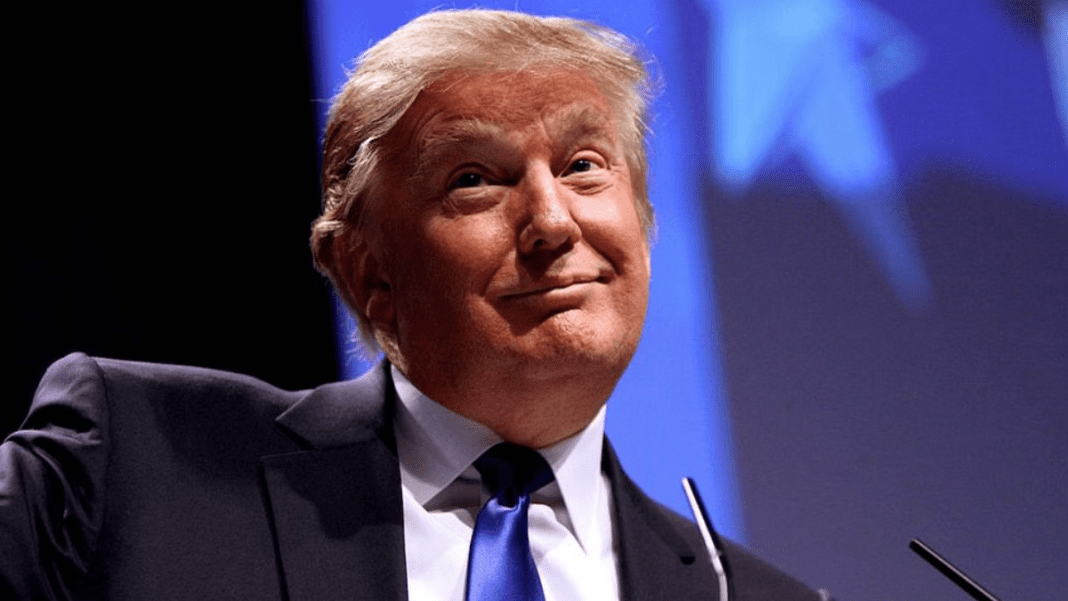During a flight aboard Air Force One, President Donald Trump told reporters he would “love” to run for office again in 2028, even though the U.S. Constitution bars presidents from serving more than two terms. The comment came as Trump was traveling to Japan on a diplomatic visit. He boasted that his poll numbers were the best they had ever been and said he would have a great chance of winning if he could run again.
When asked directly whether he was ruling out another campaign, Trump replied, “You’ll have to tell me.” He then added that he had “a great group of people”, without clarifying further. His statement immediately drew attention because it appeared to suggest he might be open to a third term, despite the clear legal restrictions in place.
The 22nd Amendment to the U.S. Constitution states that no person can be elected to the presidency more than twice. This amendment, ratified in 1951, was designed to prevent any one individual from holding power for too long. It applies directly to Trump, who has already served one term from 2017 to 2021 and is now serving another.
Reporters Question Trump’s Intent
According to ABC News, reporters traveling with the president quickly pointed out that the Constitution forbids a third term. They asked whether he would challenge the matter in court. Trump responded that he “hadn’t really thought about it” but again emphasized his strong polling numbers. He said, “We have some very good people, as you know, but I’ve had the best poll numbers I’ve ever had.”
Recent polling shows Trump’s approval rating hovering near 45 percent — below his previous high of 49 percent at the start of the COVID-19 pandemic but higher than the 34 percent recorded after the January 6 Capitol riots. Despite the numbers not matching his claim, Trump maintained that his popularity was stronger than ever.
His comments added new fuel to ongoing debates about his respect for legal limits. This was not the first time Trump has spoken about serving beyond two terms. He has made similar remarks in the past, often joking about staying in office longer. But this time, the statement came during an official trip and was accompanied by repeated references to his polling success.
Bannon’s “Plan” and Reactions
Adding to the controversy, former chief adviser Steve Bannon told The Economist last week that there was “a plan” to get around the 22nd Amendment and make it possible for the president to serve again in 2028. Bannon did not explain how this plan would work but claimed he was an “instrument of divine will,” saying people should be ready for his continued leadership.
Under current law, there is no legal pathway for such a plan. To allow a president to serve a third term, the Constitution itself would have to be amended — a process requiring approval by two-thirds of Congress and ratification by three-fourths of U.S. states. Legal scholars say that is nearly impossible under current political conditions.
Still, Bannon’s remarks and the president’s comments quickly spread across social media and major news outlets, sparking a wave of reactions. Supporters praised the idea of him continuing his leadership, while critics called it an open challenge to American democracy.
Inside political circles, aides reportedly tried to minimize the significance of Trump’s comments, saying they were made casually. Others, however, viewed them as part of a broader pattern in which Trump tests public reaction by hinting at bold or controversial ideas.
For now, Trump’s statement — “I would love to do it” — has reignited discussion about presidential power and the boundaries set by the Constitution. As coverage from ABC News and The Economist spread globally, the president’s remarks once again placed him at the center of national attention, underscoring the lasting tension between political ambition and constitutional law.
